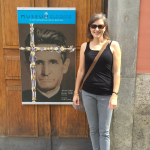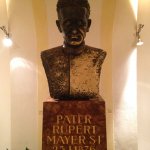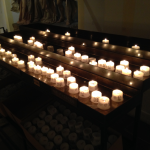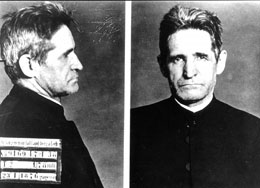
 Last summer I had the opportunity to visit the tomb of Rupert Mayer, a Jesuit priest who was a leader in the Catholic resistance movement against Nazism in Munich, Germany. Fr. Mayer’s early ministries were among the poor, especially immigrants. He also served as a military chaplain during the first world war, sustaining a serious injury to his leg. Fr. Mayer was an outspoken critic of Nazism, regularly condemning Nazism from the pulpit. In 1923 he was invited to address a Nazi gathering on the theme “Can a Catholic be a National Socialist?”” As he rose to address them, the crowd warmly applauded him. He began,
Last summer I had the opportunity to visit the tomb of Rupert Mayer, a Jesuit priest who was a leader in the Catholic resistance movement against Nazism in Munich, Germany. Fr. Mayer’s early ministries were among the poor, especially immigrants. He also served as a military chaplain during the first world war, sustaining a serious injury to his leg. Fr. Mayer was an outspoken critic of Nazism, regularly condemning Nazism from the pulpit. In 1923 he was invited to address a Nazi gathering on the theme “Can a Catholic be a National Socialist?”” As he rose to address them, the crowd warmly applauded him. He began,
“I am afraid gentlemen that your applause has come too soon. For my answer to your question can only be a negative one. No. A Catholic cannot be a Nazi.”
The applause turned to boos, but Mayer had made his point. (See link above, which credits the following sources: Mary Macken, “Pater Rupert Mayer, SJ” in Irish Quarterly Review, 1946, and John Murray, “An Apostle of the Great City: Father Rupert Mayer, SJ” in Irish Quarterly Review, 1955).
In 1939, Mayer was arrested and sent to Sachsenhausen concentration camp for repeatedly speaking out against Nazism. Then he was exiled to the monastery of Ettal until 1945, where he was not allowed to preach or hear confessions. Upon release, he returned to active ministry in Munich, and died after having a stroke while celebrating Mass in 1945.
I’ve been thinking of Fr. Mayer as I have been reading more about the rise of white nationalism in the United States. One cannot deny that this movement has grown in strength over the past few years, and is emboldened in the Trump era. The Charlottesville rally and counter-protest are just one example in an escalating pattern. Consider the following (collected by the Southern Poverty Law Center in their newly issued guidebook: The Alt-Right on Campus: What Students Need to Know):
On the day Donald Trump was elected President, students at the University of Central Florida awoke to find posters of white men and women with the headline “We Have a Right to Exist.” Distributed by Vanguard America (a group that the New York Times reports James Alex Fields, Jr., was seen with at the Charlottesville rally hours before he drove his car into a line of cars and pedestrians, leaving one woman dead and many more injured). The Vanguard America flier claimed that non-white immigrants were causing “the genocide of our people.”
Within days of the election, white nationalist Richard Spencer told an audience at Texas A&M “America, at the end of the day, belongs to white men.” At a Washington rally shortly after the election, he led a chant of “Hail Trump! Hail our people!”
The SPLC guidebook describes the white supremacist activism of Jared Taylor, Greg Johnson, David Horowitz, Matthew Heimbach, Mike Enoch (whose real name is Mike Peinovich), Andrew Anglin, and Nathan Damigo, in addition to the Proud Boys, the Fraternal Order of Alt-Knights, the Traditionalist Youth Network and the League of the South. You can find more information on the Southern Poverty Law Center website. Matt Thompson of The Atlantic describes the Unite the Right rally as more of a “pride march” than a KKK rally in this piece entitled “The Hoods are Off”. What used to be whispered behind closed doors can now be proudly proclaimed. As Christians come to understand more fully the racist structures of our society and the growing social movements aimed at terrorizing non-whites, it is hard to figure out what to do.
Today Cardinal DiNardo and Bishop Dewane issued the following public statement on behalf of the USCCB:
“As we learn more about the horrible events of yesterday, our prayer turns today, on the Lord’s Day, to the people of Charlottesville who offered a counter example to the hate marching in the streets. Let us unite ourselves in the spirit of hope offered by the clergy, people of faith, and all people of good will who peacefully defended their city and country.
We stand against the evil of racism, white supremacy and neo-nazism. We stand with our sisters and brothers united in the sacrifice of Jesus, by which love’s victory over every form of evil is assured. At Mass, let us offer a special prayer of gratitude for the brave souls who sought to protect us from the violent ideology displayed yesterday. Let us especially remember those who lost their lives. Let us join their witness and stand against every form of oppression.”
We stand against the evil of racism. We stand against every form of oppression. These are strong words. I’m proud to see leaders of my church using strong language to condemn the intimidating hate speech of white supremacist groups.
Of course, we must do more than speak. Fr. Mayer knew that, and he suffered for it. Many white Catholics feel ill-equipped to recognize racism, fight white privilege, and work to overcome structural injustices. It is hard, slow, painful work. There are no quick fixes. But the journey begins with a step. What step will you take?
Here are some ideas for white Catholics in the U.S.
- Read books about the sin of racism (for example: Bryan Massingale’s Racial Justice and the Catholic Church; Kelly Brown Douglas’s Stand Your Ground: Black Bodies and the Justice of God; James Cone’s The Cross and the Lynching Tree; Howard Thurman’s Jesus and the Disinherited; Jennifer Harvey’s Dear White Christians; and the USCCB document Brothers and Sister to Us).
- Read books about the sin of slavery to your children, and talk to them about racism today (for example: Henry’s Freedom Box by Ellen Levine; Sweet Clara and the Freedom Quilt by Deborah Hopkinson; Chains by Laurie Halse Anderson).
- Watch television programs and films that help you to better understand the struggles of oppressed peoples in our world, including African Americans and immigrant communities in the U.S. Build empathy through stretching your imagination (Have you seen Moonlight? Did you watch Treme?)
- Get involved in anti-racism work in your parish. Does your parish march in a MLK parade? If not, why not?
- Volunteer with an agency like Boys and Girls Club, Big Brothers Big Sisters, or a family assistance program through your local Catholic Charities program.
- Speak out against hate. Don’t hide behind silence on social media. Celebrate diversity explicitly in your words, actions, pictures, links, and posts. Be known for being an ally. (In speaking out, the virtue of prudence remains important. The SPLC tells readers to avoid confrontation with alt-right speakers and supporters.)
- Reflect on your daily habits, practices, and choices. Become mindful of how your daily choices both include and exclude. Bring this to prayer as you consider how to grow in virtue and follow the way of Jesus, whose ways were inclusive and who did not run away from suffering even when speaking up against intolerance and injustice cost him his life.
An excerpt from Rupert Mayer’s favorite prayer, translated into English, can be a guide for those of us who wonder how God is calling us to act in these uncertain times.
If it is your will, then it is time. When you will, I am ready, today and forever…. because your will is good, I have the courage. My heart is resting in your hands!
Rupert Mayer, Pray for Us





Trackbacks/Pingbacks